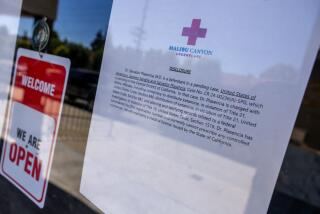Texas Doctor Freed in Terror Probe
- Share via
SAN ANTONIO — Federal authorities have released a Texas doctor they had suspected of being a key player in the Sept. 11 terrorist conspiracy--the first sign of a problem with the hundreds of people rounded up in the investigation.
Dr. Al-Badr Al-Hazmi, a 34-year-old Saudi national studying radiology here, was taken into custody the day after the airplane attacks.
Al-Hazmi arrived home Tuesday afternoon in a gated community not far from the University of Texas Health Science Center, where he was regarded as a capable physician.
“For anyone who accused me of anything without knowing the facts, I forgive them because they don’t know,” Al-Hazmi said, reading a prepared statement outside his home. In his brief comments, he appealed for tolerance and called the terror attacks “insane” crimes.
“What happened on Sept. 11 has nothing to do with any religion and it has nothing to do with Islam,” he said. “The teaching of Islam is totally against violence.”
Al-Hazmi said he looked forward to getting back to normal life.
But one of his attorneys complained that federal officials violated his rights, alleging that for six days his requests to speak to a lawyer were denied.
At least 352 people have been taken into custody around the country in connection with the attacks, and federal officials are looking for 400 more. Some Arab American and civil liberties groups have raised questions about the massive detentions.
Al-Hazmi was freed Monday in New York, where he had been held as a material witness in the terror probe. He was escorted to San Antonio by federal agents.
“The material witness warrant was dropped,” said FBI special agent Rene Salinas, spokesman for the agency’s San Antonio office.
Salinas declined to say why authorities were no longer interested in the doctor, whose detention stunned medical colleagues and members of a mosque where he enjoyed a reputation as a gentle and generous member.
Defense attorney Sean O’Shea, who represented Al-Hazmi in New York, said the physician had been cleared of suspicion.
“He cooperated fully. All cloud of suspicion, to the extent there was one, has been removed,” O’Shea said. “There’s not a scintilla of evidence that Dr. Al-Hazmi did anything wrong. . . . This has been a terrible mistake.”
Federal investigators never made public their reasons for detaining Al-Hazmi, but law enforcement sources had said they believed he may have provided financial help to the hijackers.
An FBI watch list of people wanted for questioning included Al-Hazmi’s name and those of four other people--three sharing his surname--who were booked on a Sept. 22 flight from San Antonio to Denver and on to San Diego. They were scheduled to return to San Antonio nearly a month later.
But federal agents concluded that the tickets were for the doctor and his family and were not suspicious.
Defense attorney Cynthia Orr of San Antonio said the nine-page federal affidavit used to hold her client was “very thin” in trying to link him to the conspiracy.
For instance, she said, the document noted that the doctor obtained a visa in Jidda, Saudi Arabia, the same location where some of the hijackers apparently obtained theirs.
“It’s that kind of thing,” she said. “I don’t think they established at all” that Al-Hazmi was a material witness, someone who authorities believe may have knowledge of a crime and could try to flee.
News of Al-Hazmi’s release brought relief among his friends and colleagues. Supporters had stubbornly insisted there was nothing in his actions or words during the four years he has lived and studied in San Antonio that suggested fanaticism or violence.
“I’m very happy. I know he was very undeserving of this. He’s a good and kind person,” said Abdulla Mohammed, who has worshiped alongside Al-Hazmi at the Islamic Center of San Antonio, the city’s largest mosque.
“Everything we’ve known of him would not indicate he’d be part of anything like that.”
There, Al-Hazmi was a studious member, active in the mosque’s twice-a-year “medical camp,” in which free treatment is offered to community members. He was eager to help organize lectures by scholars of Islam from around the country, mosque leaders said.
At the medical school, where federal agents seized two computers as part of their investigation, officials said the doctor was welcome to return and complete the last year of the five-year program. Al-Hazmi was known as a soft-spoken and able physician who took breaks for prayers several times a day, but was not considered a zealot.
“It’s very good news. It’s the best outcome for all of us,” said Gerald D. Dodd III, chairman of the radiology department who has worked closely with Al-Hazmi during his residency.
Al-Hazmi arrived at the Health Science Center in 1997 from Saudi Arabia under sponsorship of Aramco, the giant Saudi oil company, according to school officials.
In the resume he submitted as part of his application, Al-Hazmi indicated that he planned to return to Saudi Arabia to practice medicine following his completion of the Texas residency program.
*
Ellingwood reported from San Antonio and Serrano from Washington.
More to Read
Sign up for Essential California
The most important California stories and recommendations in your inbox every morning.
You may occasionally receive promotional content from the Los Angeles Times.














